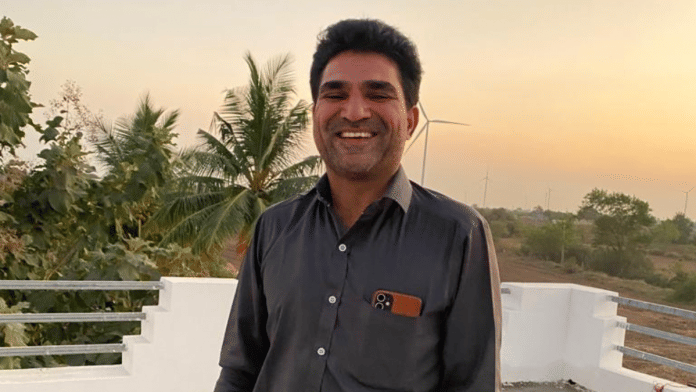If you drive down 15 km west from Khambalia town in Gujarat’s Jamnagar district, you will find a well-built temple of Kamai Mata in the Pipaliya village.
In Gujarat, more so in Saurashtra, local deities run the lives of people.
More than 40 years ago, Kherajbhai Gadhvi, a well-settled farmer in Pipaliya, who belonged to a large family and owned more than 100 bighas of land, was an ardent devotee of Kamai Mata. His wife Maniben had given birth to three daughters. But his parents and extended family were expecting a son and prayed earnestly to Kamai Mata to fulfil their wish. For centuries, Indian families have craved sons, and the Gadhvis were no different.
Talking to me in her sunny village home in Pipaliya, Maniben says, “Mara sasu ni ichcha Kamai Mata e puri kari. Isudan no janam thayo. (The earnest wish of my mother-in-law was fulfilled by Kamai Mata, and Isudan was born).”
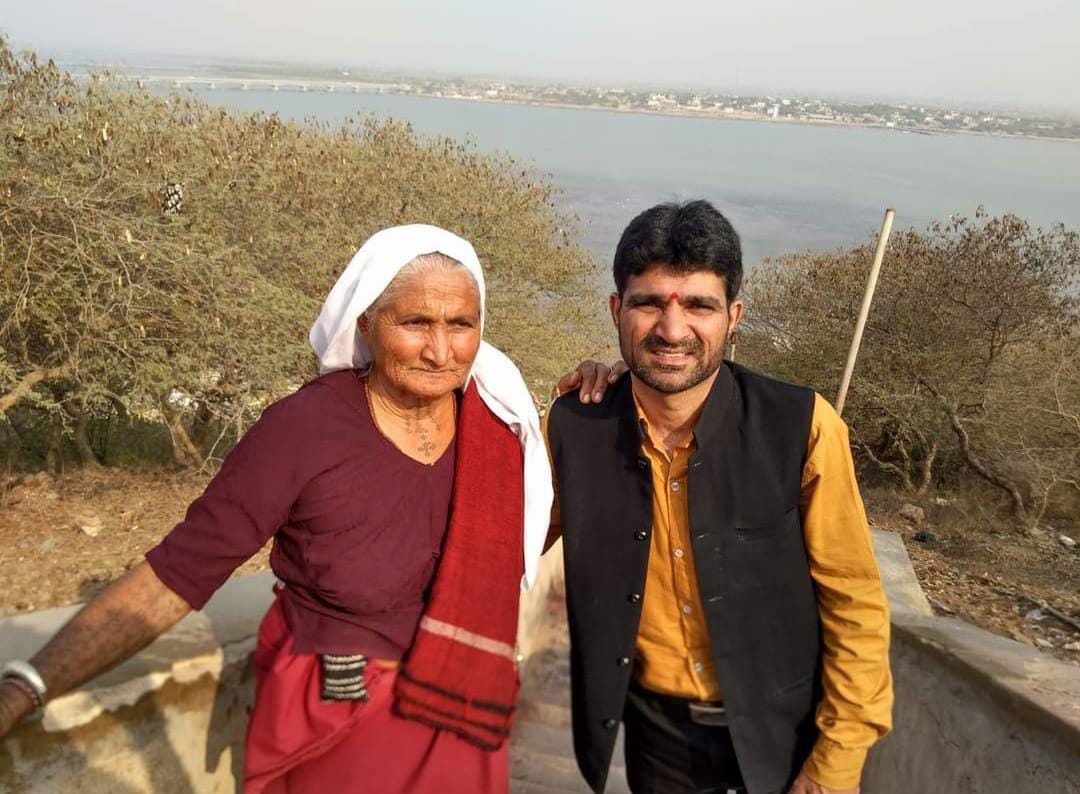
Now, four decades later, Isudan Gadhvi is the chief ministerial candidate of the Gujarat Aam Aadmi Party (AAP). He represents a transforming Gujarat. The culture in the state that has been so famously dominated by “the mercantile ethos of Baniyas” is slowly, but surely, resetting.
First inspiration
A quite pampered boy belonging to the farmer family of Gadhvis, a ‘backward’ caste with a deep cultural history and orthodox religious traditions and rituals, Isudan wasn’t interested in studies. But his uneducated father had a modern passion to educate his children and forcibly sent Isudan to the nearby towns of Khambalia and later to Jamnagar to study.
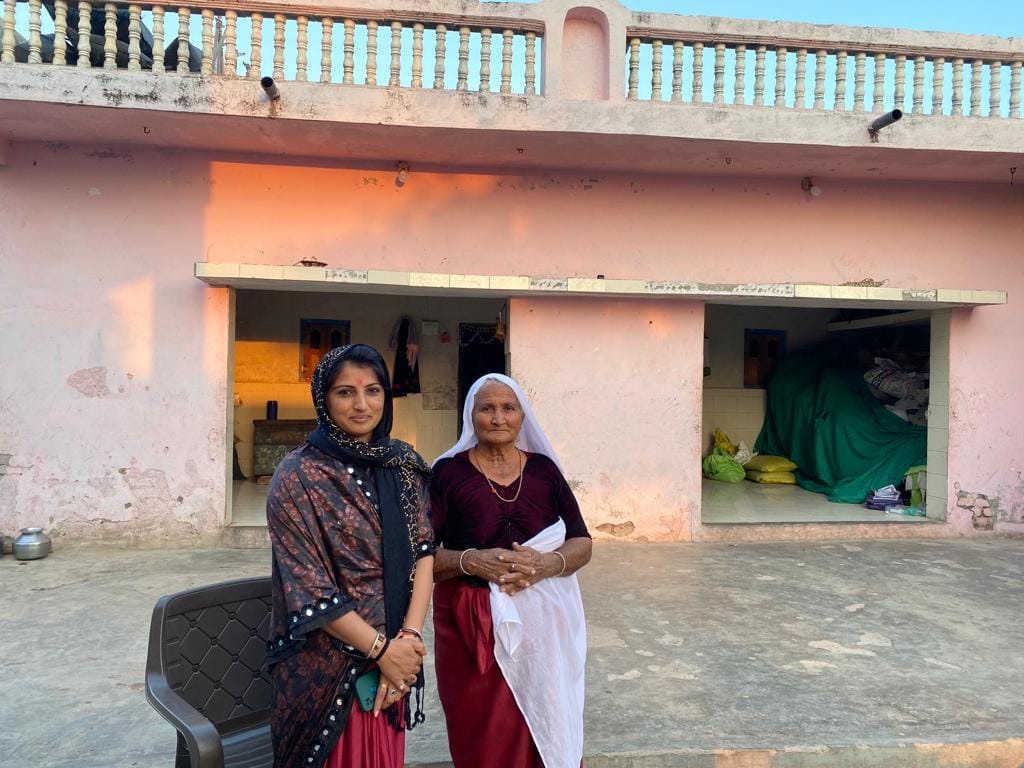
Traditionally, in Saurashtra, the Gadhvis and members of their sister caste, the Charans, were employed in the king’s durbar for eulogising the kingdom. A few of them were employed to guard the forts (gadh) and known for their loyalty and some of them for having the power to hypnotise people.
The Gadhvis of Saurashtra invariably have a powerful lyrical language, distinct dressing culture where the liberal use of red and black clothes gives a touch of mysticism, refined sense of music, and blind faith in their respective family goddesses, also known as kuldevis. Gadhvis garbas (dance performed to pray to Shakti Mata) and dairo (gatherings for reciting folk songs and stories to evoke valour and explain the philosophy of life) are the stuff of legends.
Incidentally, when Isudan was studying in Class XI in a school in Khambalia — the constituency from which he is fighting his first election today — he attended the lecture delivered by a senior visiting journalist. He was totally unaware of a career as patrakar (journalist). Hearing the lecture, Isudan was so impressed to know that journalists can quiz the people in power that he decided to become one.
He wrote a postcard to Gujarat Vidyapith, a university founded by Mahatma Gandhi, asking how he can join the course of journalism. To his surprise, the response came explaining the terms, and he left for Ahmedabad.
The farmer’s son felt completely alien in the city of traders but managed to join Vidyapith. In the oral interview, when he was asked why he wants to be a journalist, Isudan said, “I am told the political leaders and government officers pick up the phones of journalists. I can help poor people through them if I become a journalist.” After completing his studies, when he got his first job at a TV channel, he came into his element with the rustic aggression that his Gadhvi family had inculcated in him, and since then, this OBC farmer boy has never looked back.
Also read: Gujarat voters question BJP’s ‘remote-controlled’ govt. But it’s no Advantage AAP, Congress
Superstition, stardom, and journalism
Isudan’s story isn’t ordinary because he represents the stunning rise of the OBCs in today’s Gujarat where old faiths, bordering on superstitions, are on a decline but haven’t gone away within OBC communities. Even then, this strange ongoing Indian phenomenon where modern, neutral, secular, liberal technologies have become vehicles for conservative farming societies’ aspirations is breathtaking by any criteria.
These Silicon Valley-born technologies, social media platforms, and the variety of apps have been adopted smartly and widely by the OBC communities and have become the medium to acquire confidence and move ahead in life.
It is no surprise that in less than a decade, Isudan acquired stardom as a TV anchor by raising the issues of farmers, scams in real estate, corruption in government schemes, and paper leaks during exams.
His anchoring was against the establishment — furious, harsh, loud, and sometimes abusive, but the viewers of Mahamanthan, the daily programme he anchored, loved it. His Television Rating Point was 3 to 4 times higher than his nearest competitor in other channels.
Gifted by the goddess
While talking exclusively to ThePrint, Isudan narrated his journey from Pipaliya to superstar status in TV journalism and how he decided to enter the difficult terrain of Gujarat politics to oppose the all-powerful Bharatiya Janata Party (BJP).
While sitting on the terrace of his newly built home in Pipaliya on their farmland, Isudan tells me, “I was pampered by my family since my birth as I was born after three sisters. I am a gift of Devi Kamai Mata to my parents. (Hu mataji no didhel dikro chun) Kamai Mata gave a son to my parents. She gave a birthmark on my back as evidence that I am gifted by Mata to my parents.”
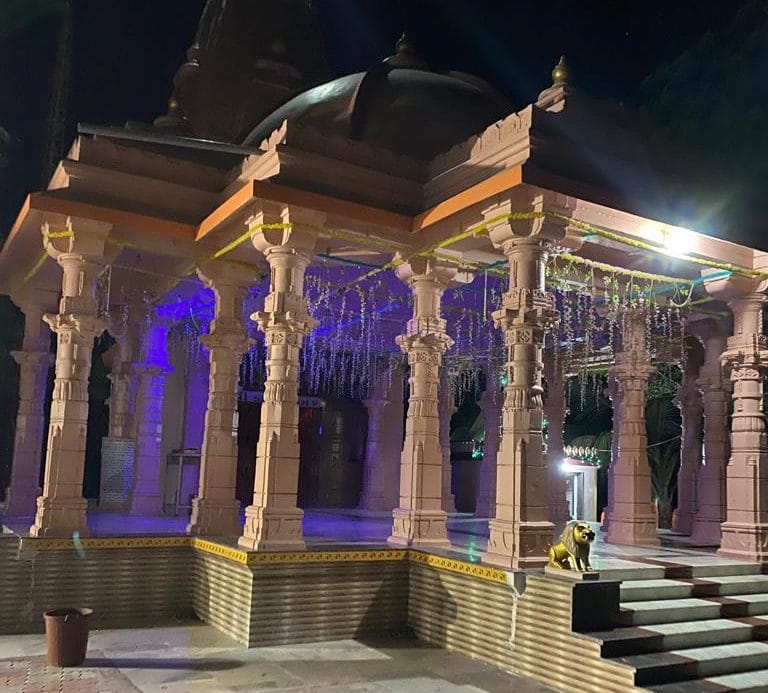
“Mata ji told my parents I will have this birthmark. I am blessed by Mata ji. We Gadhvis are deviputras. Gujarat’s kuldevis are born in our caste. I have total faith in Kamai Mata. If I chant her name five times, I can get out of any difficulty. Whenever I leave my village, I touch her feet, and whenever I return to Pipaliya, even if it’s past midnight, I bow to her. My family is so blessed and united because of her blessings. Due to Kamai Mata, I have had a happy childhood. We played in dusty lanes and enjoyed life on farms. I could buy two-wheelers and cars. I am fond of gardens, so I created exclusive one for me. I know sowing well and could ply bullock carts on our farmland.”
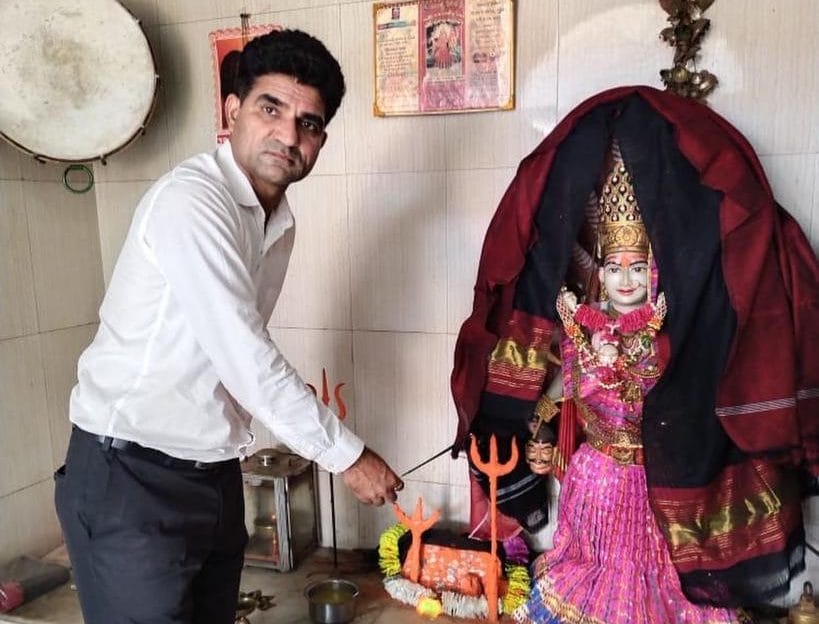
His uneducated grandmother made it a point that Isudan recited two chapters of the Ramayan or Mahabharat to her every day. Isudan has memorised both the granths.
Isudan’s father, Kherajbhai, had studied only till Class IV. But he was so bent upon educating Isudan that when the latter refused to go to school in the neighbouring town, he called a meeting of senior community members to cajole Isudan and explain the importance of education.
No surprise that his farmer father has been the biggest influence on Isudan. Kherajbhai was so attached to his son that he later gave him company when the latter went out to report investigative stories for ETV network.
Kherajbhai suffered from an incurable kidney ailment. When he died on 15 April 2014, Isudan got extremely depressed and couldn’t live in his native home, which was full of memories of his father. Even today, he misses him so much that he can’t see his photograph.
His father was a devotee of Nagbai Mata whose temple is in the nearby village of Beraja. He kept an akhand divo (earthen lamp kept lit 24/7) in the temple; Kherajbhai was the bhuva. Bhuvas are known for “spiritual healing”, tantric practices; some of them are head saints of community temples too.
Isudan claims, “My father observed a fast for nine days of Navaratri. He lived only on water. He was spiritually so powerful that during his fasting time, if he gave bhabhuti (holy powder) to devotees, any desire could be fulfilled. Nagbai Mata has blessed childless couples with children too. A day before he died, my father had told us that his time is up. He took a promise from us that after his death, we will light akhand divo at Nagbai temple during Navaratri.”
Isudan, whose real name is Ishwardan, is such a deep believer in the power of praying that every time he joined a new job, he prayed to Amba Ma at the temple in North Gujarat and always took charge of any new job at ‘auspicious vijay muharat’ of 12.39 pm on 15 April. He is highly influenced by books on sadhus and tantriks. He has read dozens of well-acclaimed books of yogis living in Himalayas, Junagadh and forests of Saurashtra. He tells me, “I never ever imagined I will become such a big journalist. I never thought I will get such a huge fan following. But I took up people’s issues of farm loans, farm insurances, lack of good education and Covid mismanagement. People showered love on me.”
Also read: How father-son rift in tribal party BTP could affect poll prospects of major players in Gujarat
The first step into politics
The scarcity of oxygen during the second wave of the pandemic in Ahmedabad changed his life forever. When his mother got infected, he couldn’t manage hospital admission for her but somehow arranged for oxygen cylinders and medical help at home. He too got infected while taking care of her. When he recovered, he blasted the BJP government on his TV programme for a rule that Covid patients will be admitted to hospitals only if they are in government-approved ambulances (available on dialling 108).
Isudan saw a Covid-infected young man dying outside the gate of an Ahmedabad hospital on the lap of his mother in a private car. He decided to resign then and there.
He says, “There is no option but to change such spineless leaders who are responsible for creating such a situation.”
Isudan tells me, “I hate politics, but I have entered it because I am unable to bear the pain of ordinary people. I knew well that I was having a safe job. I was charging Rs 1 lakh for inauguration of events and would fly chartered helicopters for public shows. I was living in comfort. I had money, land, family, and all that I desired. I resigned to help solve problems of people. I have prepared policies on health, education, and farming to implement if I get into power and become a chief minister. After resigning, when I came home in Pipaliya, the local leaders of the Congress, BJP and AAP were at my home.”
On the invitation of Arvind Kejriwal, Isudan flew to Delhi with Gujarat AAP president Gopal Italia. He saw the school management of the AAP government and its other work too. Kejriwal convinced him to join the party. When I ask him why he didn’t join the BJP, Isudan says, “I don’t want to be a puppet. In AAP, I will implement policies I have prepared.”
In the last 15 months, Isudan has travelled nearly 1.10 lakh km in the nooks and corners of Gujarat to address more than 1,200 meetings. He says that after he joined the AAP, within two months, it got “missed calls” of 5.5 lakh people willing to join it. Around 2.86 lakh Gujaratis have joined full-time to work for the party in its 6,000 offices in urban Gujarat and more than 10,000 offices in rural Gujarat.
Isudan says, “I had everything that I wanted, but on the other side was the sheer pain of people. When I meet people and give them assurance that ‘Tiger abhi jinda hai’, people start crying and tell me ‘We trust you’.” He is fully confident that the BJP’s urban seats will see shocking results. He expects AAP’s victory on around 8 to 9 seats in Surat alone.
The confidence in the AAP
In a lengthy discussion, he elaborated on how the Congress has been compromised by the BJP, and that has paved the way for the AAP. “We are confident to form the government. Our survey shows that out of 66 seats in urban Gujarat, the BJP will lose 32 seats. It will struggle to get 25 seats in rural Gujarat. People are tired of the BJP, while Kejriwal is having credibility. Our ‘guarantee card’ of free power and other things have clicked in a big way. People are likely to vote disregarding caste equations.”
He says that the BJP fears the AAP because in the last election it got only 99 seats and two victories were challenged in courts. On around 31 seats, the BJP won with a margin of less than 5,000 and many of these seats had no less than 5,000 NOTA votes.
He says, “When Kejriwal talked about issue of pay grades in police force, Gujarat’s more than 50,000 policemen belonging to disciplinary force changed their status on WhatsApp to appreciate Kejriwal’s promise to them. They wrote, ‘Now only alternative is AAP’. This is a change. This is revolution. You are unable to see the revolution. If I take into account people who took up a ‘guarantee card’, then the AAP will get minimum 1.60 crore Gujarati votes for sure.”
He claims that due to raising people’s issues relentlessly on TV, the farmers of Gujarat have got benefits of Rs 10,000 crore through government schemes, including crop insurance and interest-free farm laws. Isudan is pitted against local muscleman and two-time MLA Vikram Madam of Congress and Mulubhai Bera, former BJP minister. Bera, considered a weak candidate, got political heft when Reliance’s face in the Jamnagar area, Parimal Nathwani, joined him while filing the nomination form.
Isudan tells me, “I want to fight this election and wipe the tears of poor people. I want a system where, if any farmer enters the office of a district collector, he should stand up and salute the farmer. I have no godfather. I don’t have Rs 500 crore to fund election nor anyone had been even a sarpanch in my family. I am a son of a small OBC community in a small village of Gujarat. I believe I am blessed. Some invisible power is pushing me into politics. When poor persons are in anguish, God sends someone to help them. I am not a neta. I am an aam aadmi. I don’t even have a passport. By entering into a political career, I am looking forward to moksha.”
Sheela Bhatt is a Delhi-based senior journalist. Views are personal.
(Edited by Humra Laeeq)



